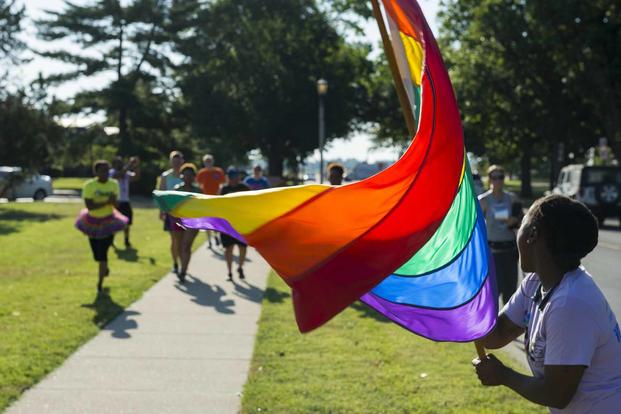Amid a growing trend of state laws that target members of the LGBTQ community, the Navy, Marine Corps and Air Force all say that they have existing policies and procedures in place to help service members transfer to new duty stations if they feel unsafe or discriminated against.
However, the Navy explained that, as of June, it "has not received, and therefore not approved, any requests for safety transfers for reasons related to state laws or policies that may affect LGBTQ+ Service members or their dependent.”
It is not clear whether that figure is the result of absent need, disapproval at lower levels of command, or a lack of awareness by sailors.
Read Next: VA Employee Filmed Beating Patient Suspended Without Pay
The Air Force did not reply to a request for comment on how many airmen have utilized the option. The Marine Corps did not provide a number, but explained that "each service member's assignment is assessed individually and state law is not an articulated factor in the assignment process."
The Human Rights Campaign, a nonprofit organization that focuses on LGBTQ discrimination, said that last year was "the worst year for anti-LGBTQ legislation in recent history" with 17 laws targeting the community enacted and another 11 awaiting a governor's signature. Two measures that drew outsized attention this year were Florida's so-called "Dont Say Gay" bill, passed in March, that forbids discussion of sexual orientation and gender indentity until the third grade and an order by Texas Gov. Greg Abbott, issued in February, that directred the state's child welfare agency to investigate reports of gender-confirming care as child abuse.
While military installations are considered federal property and thus not subject to state laws, service members rarely reside entirely within their boundaries. Laws that limit medical services that can be offered in the state, restrictions on adoptions or foster care, and the absence of non-discrimination protections could easily impact service members and their dependents who live, shop or try to access medical care off-base.
For example, in South Dakota -- home of Ellsworth Air Force Base -- it is legal for businesses to deny services to LGBTQ people under the premise of religious freedom.
All three branches that Military.com spoke to noted that the health and well-being of their service members is a top priority. The Navy and Air Force pointed to preexisting policies that were developed with victims or witnesses of abuse and sexual violence in mind as options for sailors and airmen who now feel discriminated against by state laws.
Military.com reported in May that the Army was considering expanding its "compassionate reassignment" policy to soliders who feel state or local laws discriminate against them based on gender, sex, religion, race or pregnancy.
"State law is not an articulated factor in the assignment process, however a service member can request a 'safety transfer,'" the Navy said in an emailed statement.
In March, following the controversial efforts in Texas and Florida, the Department of the Air Force issued a statement reminding airmen and Space Force Guardians that there are resources they can utilize to navigate these local laws.
"The health, care and resilience of our DAF personnel and their families is not just our top priority -- it's essential to our ability to accomplish the mission," Under Secretary of the Air Force Gina Ortiz Jones said in a statement. "We are closely tracking state laws and legislation to ensure we prepare for and mitigate effects to our Airmen, Guardians and their families. Medical, legal resources, and various assistance are available for those who need them."
Air Force officials pointed to medical treatment facilities for health care, installation legal offices for advice, and the department's Exceptional Family Member Program as a way to navigate a possible change of duty station "to assist families with special needs," the statement detailed.
Unlike the Army's draft policy, there is not an existing rule or one in the works that would specifically cover discriminatory state laws, according to Air Force spokeswoman Ann Stefanek, but existing programs could apply to those situations.
An airman or Guardian's situation would have to fit other reassignment standards that already exist, such as the department's Humanitarian Reassignment and Deferment Program, Stefanek said. That policy, traditionally, has been available only for short-term moves.
Approval for many of these reassignment programs would start with an airman or Guardian's commander; then, they would go through the chain of command, which could lead to a time-consuming and convoluted process for those seeking more immediate relief.
"As is the case with all of our family members, if the support a family member needs becomes unavailable, commanders can work to get the service member to an assignment where their loved ones can receive the care they need," Jones said in her statement.
The Air Force did not immediately return a request for comment asking what other programs could potentially be applied to help alleviate the effects of discriminatory state laws.
The Marine Corps explained that, "while state law is not an articulated factor in the assignment process, the Marine Corps allows a service member to request re-assignment" over safety or well-being concerns but did not cite a specific policy.
However, the branch is also undergoing a major restructuring of how it manages Marines and their assignments. In previous discussions with the media, Marine leaders emphasized that they are willing to hear out the concerns of their service members and work with them to find solutions.
As part of the debate around this year's defense policy bill, Rep. Matt Gaetz, R-Fla., introduced an amendment that would have barred permanent changes of station done for the "sole basis" that a service member "disagrees with a state or local law" for any military branch -- a position he noted was driven by learning about the Army's draft policy from Military.com's reporting.
The amendment failed along a party-line vote.
LGBTQ members of the military -- especially transgender troops -- have seen quickly shifting policies and rules the past few years. Although gay and lesbian service members have been able to serve openly for almost 11 years, transgender troops were only authorized in 2016. Then, in July 2017, then-President Donald Trump reversed that policy via Twitter, announcing that the U.S. government would no longer allow "transgender individuals to serve in any capacity in the U.S. military." In January 2021, five days into his presidency, President Joe Biden reversed that reversal.
Despite these changes, and the policies that the services say are in place to help service members, life for LGBTQ troops or dependents is hardly simple. The War Horse reported that some still experience open discrimation or intimidation -- even on base.
The Navy and Air Force policies both note that requests for transfer are just that -- requests that can be denied. The Marine Corps statement noted that "requests are reviewed and adjudicated on [a] case-by-case basis."
In the meantime, the situation for the LGBTQ community in America as a whole appears to be growing more dire. GLAAD, a nonprofit advocacy group for the community, recently released a report that found that "a significant majority of the LGBTQ community -- a startling 70% -- says that discrimination has increased over the past two years."
The report also notes that "seven in ten [LGBTQ people] report personally experiencing discrimination" -- an 11% increase from a year ago.
In May, critics, including Sen. Marco Rubio, R-Fla., forced the cancellation of a "Drag Queen Storytime" event at Ramstein Air Base in Germany. Although drag show-type events have been held at other bases, including a similar event the year before at Ramstein, Rubio said in a May 26 letter that "it is completely insane for Ramstein AFB to use on-installation resources for rituals like 'Drag Queen Story Time.'"
-- Rebecca Kheel contributed to this report.
-- Konstantin Toropin can be reached at konstantin.toropin@military.com. Follow him on Twitter @ktoropin.
-- Thomas Novelly can be reached at thomas.novelly@military.com. Follow him on Twitter @TomNovelly.
Related: Pentagon Quietly Looking into How Nonbinary Troops Could Serve Openly











